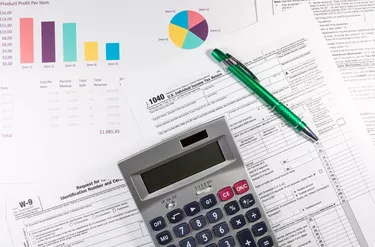
Every year, many people request an extension when filing their federal taxes with the IRS. Filing an extension for federal taxes can be completed by filling out and filing Form 4868, "Application for Automatic Extension of Time." As is the case with most IRS dealings, the hardest part is often the waiting game, which makes checking the IRS extension status crucial to alleviating stress.
What Is an IRS Extension?
Video of the Day
An IRS extension is an automatic extension to an individual's tax return deadline. However, it is essential to remember that a filing extension does not apply to payments due. Even if you are granted an extension, payment is still expected on the original deadline. Otherwise, you will start to receive penalties and compounded interest on the amount you owe in taxes to the federal government.
Video of the Day
According to the IRS, extensions can be requested by either paying all or part of the estimated income tax while indicating an extension. You could also file Form 4868 electronically through a tax professional or the IRS's e-file option, or through the mail in an enclosed payment.
Reasons for Filing for an Extension
There are many reasons why someone might need to file an extension. From a lack of organization to unexpected emergencies, some people benefit greatly from an extension. Extensions allow them more time to collect the necessary documents they need to accurately file their tax return.
Applicants can file for an extension under the following circumstances: incomplete documentation and unexpected life events. According to Turbo Tax, the IRS grants an extension so you can have more time to collect missing documents. For example, if you have misplaced your W-2, it is best to file an extension and wait to receive a replacement rather than attempting to estimate your earnings for the year.
Extensions may also be granted in the event of a natural disaster, a death or illness in the family or any other event that may interfere with your ability to file on time. When filing Form 4868, you are not required to provide a specific reason, so it is unnecessary to worry about whether your situation will be considered valid in the eyes of the IRS.
Reasons the IRS May Reject an Extension
While not overly common, the IRS has grounds to reject extensions regardless of when they were filed, either on or after the deadline. Applicants are informed that their extension was denied via email. The IRS can deny extensions because of misspellings, transposed numbers or other errors that were made while filling out the form. If the IRS cannot verify your identity or the information because of an error, they may deny the application.
Another reason for denial could be the use of out-of-date information. Old addresses and changed surnames can add complications if they do not match previous IRS records. In the event of a denied application, taxpayers are given a window of time to remedy these errors and file again. In most cases, applicants are given five days.
How to Check IRS Extension Status
If you applied for an extension electronically, you should receive an email within 24 hours informing you that your extension was received. If you applied via mail, you will most likely not get verification that it has been received. However, you can always call the IRS office for proof of tax extension. Working with an accountant or tax expert to file your extension can also give you more peace of mind.